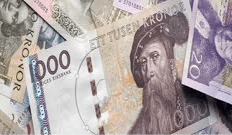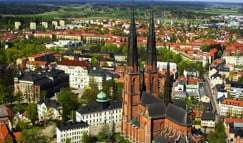May 21st, 2015

ACEI recently offered a training webinar on Sweden and it’s education system, with particular focus on upper secondary (high school) education. We thought in this week’s blog we share with you a few interesting facts we gathered in our research on Sweden.
Geography & Population

• Population is 9.7 million people.
• Capital of Sweden is Stockholm (built on 14 islands).
• The official language is Swedish.
• 3rd largest EU country in land area, after France and Spain.
History

• Sweden is one of the homelands of the Germanic ethnicity and culture.
• Around 2,000 years ago, the Svear people gave Sweden its name. In their language, svear meant “us” and rike meant “kingdom.” So, Sverige, the modern Swedish name of the country, means “Our Kingdom.
• In the 9th and 10th centuries, Swedish Vikings invaded and settled in parts of Eastern Europe as far as Constantinople and the Caspian Sea.
• In 1954, while excavating a Viking settlement in Sweden, archeologists found a Buddha statue from India.
Government

Image: Rosenbad in Stockholm, seat of the Government since 1981
• Parliamentary democracy.
• Sweden’s head of state since 1973 has been King Carl XVI Gustaf.
• Sweden is a member of the European Union, but has its own currency, the krona, or Swedis crown.
• In 1862, Sweden became the first country to grant suffrage for (married) women, although only for local elections.
• With 47% of female parliamentarians (in 2006), Sweden has the highest proportion of women lawmakers in the world.
Economics & Employment

• Sweden has the highest standard V.A.T. rate in the world (25%).
• Total taxation in Sweden amount to 54.2 % of GDP, the highest level worldwide.
• In 2010, 2011 and 2012, Sweden was ranked third in the world for the inequality-adjusted Human Development Index(HDI) defined by the United Nations Development Program.
• Swedish people have the lowest income inequality in the world, with a Gini index of 23 in 2005.
• Sweden has the smallest gender employment-rate gap in the developed world, with only 4% more men in employment than women.
• Sweden has the highest percentage of working mothers in the developed world, no less than 76% of them.
Society, Social Justice and Welfare

• Lagom is an important and often-used word in Sweden. Meaning good enough, or just right, it sums up Swedish cultural and social ideals of equality and fairness.
• Homosexual relations have been legal since 1944, and same sex couples have been able to adopt since 2003 and get married since 2009.
• The country was the first in the world with freedom of the press (1766), and is at the top of global press freedom rankings.
• Secular and open to all religions. The national church, the Church of Sweden, is Lutheran, but Catholicism and other Christian denominations are also
• In 2006 Swedish people had the longest life expectancy in Europe (80.51 years).
• A 2007 UNICEF report on child well-being in rich countries ranked Sweden as the best country in terms of children’s material well-being, health and safety, and behaviors and risks.
• Sweden is the only nation where donations exceed 1% of the GDP.
• The Swedish maternity and paternity leave is one of the longest and most generous in the world, allowing the father and mother to take a shared total of 480 days (16 months) off at 77.6% of their salary.
Science & Innovations

• The astronomical lens is a Swedish invention.
• The pacemaker, ultrasound, safety match, astronomical lens, marine propeller, refrigerator, and computer mouse are all famous items that were invented in Sweden or by Swedes who weren’t living in Sweden.
• As of late 2012, Sweden had obtained 30 Nobel prizes, including 5 Peace prizes. This is the 5th highest number of laureates in the world, and the highest per capita ratio for any country with over 1 million inhabitants.
• Sweden has the highest number of patents granted per capita of any European country, with 271 patents per million people.
• Sweden ranks second in Europe (after Finland) in terms of technological achievement.
• In 2012 the Swedish company Ericsson was the world’s largest manufacturer of mobile telecommunications networks, with 38% of global market share.
• Sweden has an excellent reputation as a car-maker with Volvo and Saab. Scania trucks are also Swedish.
• The world-famous discount furniture chain IKEA was founded in Sweden in 1943.
Environment & Energy Self Sufficiency

• Sweden is set to become the first country in the world to phase out petroleum for biofuel.
• Sweden has the highest number of nuclear plants per capita, with 10 reactors for 9 million inhabitants.
• Only one per cent of solid waste goes to landfill in Sweden – with the rest recycled or used to produce heat, electricity or vehicle fuel in the form of biogas.
• Sweden is so efficient in recycling that it has run out of trash and receives Norway’s trash to process and recycle.
Education Governance

• The Ministry of Education (Utbildningsdepartementet) is responsible for primary and secondary education as well as higher education with a few exceptions (agriculture, in particular).
• The Swedish National Agency for Education (Skolverket) is responsible for policy implementation and quality control concerning primary, secondary and adult education.
• The Swedish Council for Higher Education (Uiversitets- och Hogskoleradet) and the Swedish Higher Education Authority (Universitetskanslerambetet) are responsible for higher education.
Education: Compulsory and Upper Secondary

• Nursery school (kindergarten, förskola) is open to children from one to five years of age. Almost all children also attend non-compulsory primary school at the age of six (sexårsverksamhet). In practice, this means ten years of education in all.
• Education is compulsory for children between the ages of 7 and 16 and free.
• Education at the upper secondary level is free.
• The academic year runs from August until June.
• There are also a small number of schools for the Saami minorities in the north of Sweden were classes are taught in Sammi
• The 12-year elementary and secondary system is divided into 2 phases: primary education (Grundskola – 9 years of compulsory school covering primary education and junior secondary education); senior secondary education (Gymnasia – 3 years of senior secondary school).
• Students who complete the Grundskola receive the Slutbetyg Från Grundskola (School Leaving Certificate).
• Student who complete the Gymnasia receive the Slutbetyg Från Gymnasieskola.
• Also at the upper secondary level there are Folkhögskola (Folk High School) and Komvux (Municipal Adult School) which are for Adults (with some previous education & work experience and do not charge tuition.
• Corporal punishment in schools was banned in 1979.
Education: University

Image: Uppsala University
• Sweden has two main types of higher education institutions: universities (universitet) and university colleges (högskola). Both grant bachelor’s and master’s degrees, but only universities grant doctoral degrees.
• Sweden has around 50 public and private universities and university colleges.
• Two of the oldest universities in Sweden are Uppsala University which was founded in 1477 and Lund University founded in 1666.
• The Swedes spend the longest time in tertiary education with an average student age of 25.5 years old.
• Swedish university students are required to pay a membership fee in the student union, but do not pay tuition.
• 40% of Swedish women and 32% of Swedish men aged 25 to 64 participate in education or training.
• Sweden has the highest proportion of personal computers per capita in Europe, with 500 P.C.’s per 1,000 people.
Bonus Fun Facts:
• There’s a golf course on the border of Sweden and Finland with half the holes in one country and the other half in another.
• Sweden has the highest number of McDonald restaurants per capita in Europe (although that is only about half of the US ratio).
• Swedish was made the official language of Sweden in 2009.
• In the interest of safety, Sweden’s auto company, Volvo, made the three-point seat belt design patent open and free to other car manufacturers.
• In Sweden, you cannot name your child Ikea or Elvis.
• The official Twitter account @Sweden is given to a random citizen every week to manage.
• The origin of the word Smörɡåsbord is Swedish which according to Merriam-Webster online dictionary is “a luncheon or supper buffet offering a variety of foods and dishes (as hors d’oeuvres, hot and cold meats, smoked and pickled fish, cheeses, salads, and relishes).”
For more random facts on Sweden click on this link: http://facts.randomhistory.com/sweden-facts.html

The Academic Credentials Evaluation Institute, Inc. (ACEI), was founded in 1994 and is based in Los Angeles, CA, USA. ACEI provides a number of services that include evaluations of international academic credentials for U.S. educational equivalence, translation, verification, and professional training programs. ACEI is a Charter and Endorsed Member of the Association of International Credential Evaluators. For more information, visit https://acei-global.org/.


